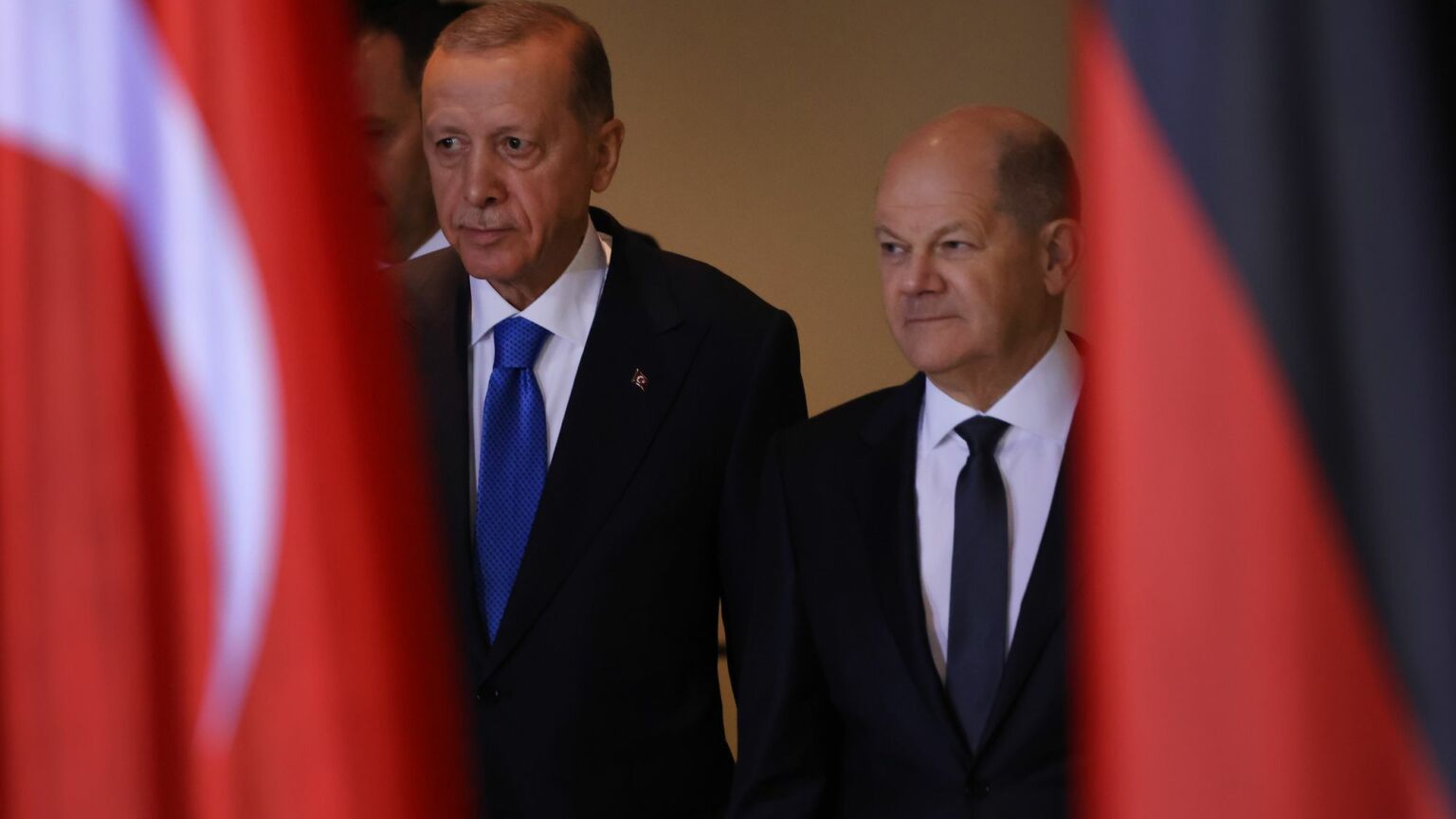Germany is in danger of betraying Israel
Chancellor Olaf Scholz’s attempt to appease anti-Israel bigots is an act of profound cowardice.

Want to read spiked ad-free? Become a spiked supporter.
Time and again, German chancellor Olaf Scholz has appeared incapable of sticking up for his support for Israel. Indeed, he often seems more concerned with appeasing Israel’s critics.
This became painfully apparent earlier this month during Turkish president Recep Tayyip Erdoğan’s trip to Berlin for a meeting with Scholz. In their joint press conference, Erdoğan claimed that Germany was stuck in a ‘psychology of guilt’ when it comes to Israel. With Scholz standing stoney-faced next to him, Erdoğan said that, because Turkey did not share Germany’s Holocaust history, it had no debt to Israel.
This should have been a chance for Scholz to reject the pernicious idea that Germany only supports Israel because of a deep-seated feeling of historical guilt. Yet Scholz failed to rise to the challenge. He merely said Germany and Turkey had ‘very different perspectives on the conflict’.
It was a profound mistake for Scholz to duck this challenge. After all, it’s not just Erdoğan who thinks that Germany’s support for Israel is born of historical guilt. This view is increasingly widespread among Islamists and the Islamist-adjacent in Germany itself. ‘Free Palestine from German guilt’ was heard at the controversial, borderline anti-Semitic Documenta Fifteen art exhibition in Kassel last year, and it’s now a popular slogan at the many pro-Palestine demonstrations.
Scholz had an opportunity to challenge this mistaken perception of Germany’s relationship with Israel. He had a chance to point out that standing with the Jewish State against the barbarism of the 7 October attacks has nothing to do with historical guilt. It is simply the right thing to do.
But Scholz instead decided to avoid an argument and appease not just Erdoğan, but also Germany’s increasingly vociferous critics of Israel, many of whom are drawn from the Muslim community.
In this regard, Scholz has shown himself to be fearful of Erdoğan’s influence within Germany. This is because Erdoğan has long posed as the defender of Germany’s Turkish and wider Muslim community. He is able to exert a lot of influence through the Turkish-Islamic Union for Religious Affairs (DITIB). Technically an arm of the Turkish state, the DITIB funds over 900 mosques in Germany and claims to represent over 70 per cent of German Muslims. So powerful is the DITIB, that some critics have accused it of creating a ‘parallel society’ within Germany.
Against the backdrop of the war in Israel, Scholz seems more fearful than ever of the influence and power of Erdoğan and DITIB. Not least because Erdoğan’s recent statements have been particularly provocative. He has called Israel ‘a terrorist state’ that has embraced ‘fascism’ and has referred to Hamas as ‘freedom fighters’. Some German pundits were even worried that Erdoğan might attempt to address anti-Israel demonstrations in Germany during his visit.
That didn’t happen, of course. But so fearful was Scholz of offending sections of Germany’s Muslim population, he decided to appease the Turkish president.
Of course, it doesn’t help that Scholz has a history of responding meekly to criticisms about Israel. When the Palestinian president, Mahmoud Abbas, visited Berlin last year, Scholz kept schtum as Abbas attacked Israel and shamelessly engaged in Holocaust relativism. Abbas even said Israel had committed the equivalent of ‘50 Holocausts’ against the Palestinians, to which Scholz said nothing.
The chancellor’s policy of appeasement is a dangerous strategy. Firstly, pandering to Israel’s most vicious critics will only embolden the Israelophobes further. And secondly, it further undermines the German public’s support for Israel, which is already very low.
Indeed, in a poll carried out last year, only 27 per cent of Germans thought that Germany had an obligation to support Israel for historic reasons. The same poll showed that a mere 46 per cent of Germans held a positive view of Israel. The war has only deepened this scepticism. In a poll carried out a few weeks after the October pogrom, just 31 per cent of those questioned said that Israel’s response in Gaza was adequate and right.
Scholz is doing nothing to challenge such perceptions of Israel. Even after the worst attack against Jewish people since the Holocaust, Scholz has found it seemingly impossible to take a clear moral stance.
Germany does have a unique obligation to remember its past crimes against Jewish people. But standing for Israel and against Hamas is not a question of past guilt. It’s a question of present necessity. Germany’s support for Israel must be more than empty rhetoric.
Sabine Beppler-Spahl is spiked’s Germany correspondent.
Picture by: Getty.
Who funds spiked? You do
We are funded by you. And in this era of cancel culture and advertiser boycotts, we rely on your donations more than ever. Seventy per cent of our revenue comes from our readers’ donations – the vast majority giving just £5 per month. If you make a regular donation – of £5 a month or £50 a year – you can become a and enjoy:
–Ad-free reading
–Exclusive events
–Access to our comments section
It’s the best way to keep spiked going – and growing. Thank you!









Comments
Want to join the conversation?
Only spiked supporters and patrons, who donate regularly to us, can comment on our articles.